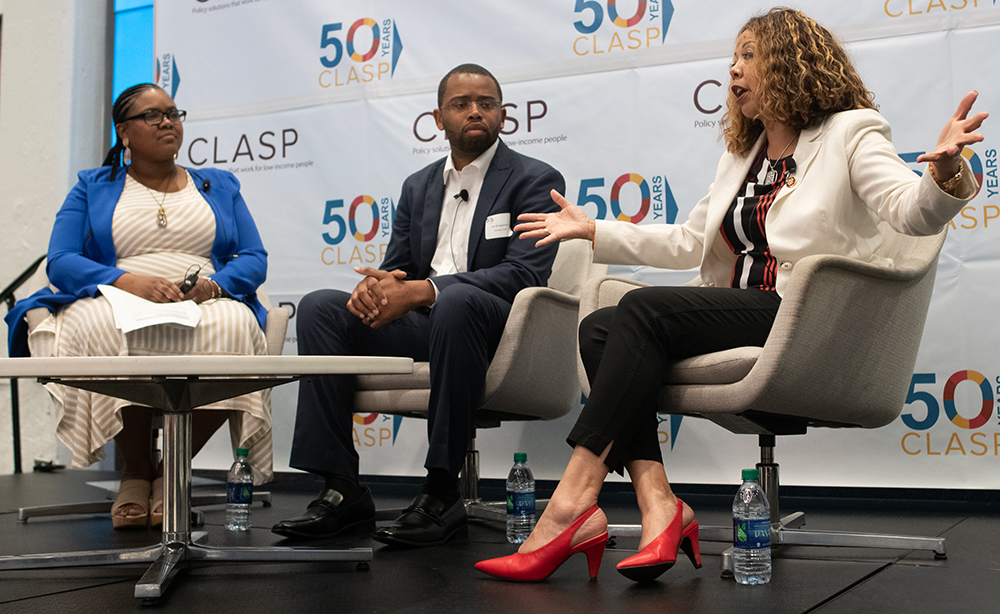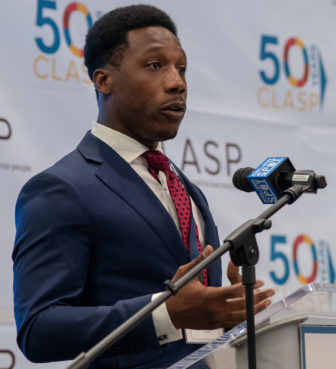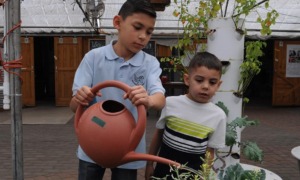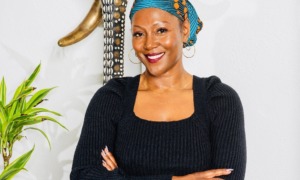
Photos by Danielle Miles
Rep. Lucy McBath (right) speaks on panel as Kisha Bird, director of youth policy for the Center for Law and Social Policy (left), and Ian Bridgeforth, founder and executive director of Georgia Shift, listen at Atlanta event.
ATLANTA — Achieving equity in the U.S. starts with giving young people of color a level playing field, Rep. Lucy McBath says.
McBath, a Democrat, is trying to create a cultural shift in how Washington policymakers view young people of color, she said at an event in Atlanta on Tuesday. She began grassroots organizing against gun violence after her son was fatally shot in 2012, and in 2018 won a bid to represent Georgia’s 6th district.
Although activism and marches are important tools for change, she said, it’s not enough: “You have to have champions on the inside that can create the legislation and the policy that has to be voted on, and that’s how you expedite the change.”
McBath spoke on a panel before more than 100 local and regional leaders who work to connect young people to educational and employment opportunities. The event was the first in a series organized by the Washington, D.C.-based Center for Law and Social Policy (CLASP) to celebrate its 50th anniversary. It also marked a step forward in their work with local partners to help young people who are neither working nor in school — an issue that is particularly pronounced in the South.
“The South is really in many ways ground zero,” said CLASP board member David Dodson, who is president of MDC, a nonprofit that works with vulnerable people and communities in the South.
Across 13 counties in the metro Atlanta area, there are more than 51,000 people between the ages of 16 and 24 who are not working and not in school, according to data from the American Community Survey. In Georgia, that number is more than 130,000 — about 15% of the total state population in that age range.
Georgia ranks 44th among 50 states and the District of Columbia in the percentage of youth who are disconnected, according to the national Opportunity Index. Other Southern states including Alabama, Kentucky, Louisiana, Mississippi and South Carolina all rank in the lower quartile on the same measure.
Efforts to support these young people have been ongoing since at least 2012, when the White House Council for Community Solutions reported that a growing portion of them were becoming disconnected from the labor force. The report described them as “opportunity youth” to highlight their potential. Research shows that opportunity youth are disproportionately from low-income households, black and Hispanic.
Youth help youth
Since then, the number of opportunity youth across the U.S. has decreased from an estimated 6.7 million to about 4.8 million. However, the change has not been consistent for all cities or regions, said Michele Jacobs, director of youth development at United Way of Greater Atlanta, one of CLASP’s local partners.

Daniel Rosebud consults with organizations on how to be sustainable and provide ongoing support to young people during critical transition periods.
Jacobs works with the Youth Services Collaborative, which began in 2013 to make it easier for young people in Atlanta to access support — whether it’s a free Lyft ride to a job interview or affordable child care services so they can attend classes to further their education. Barriers remain, she said. For example, in order to access some federally funded services, young people must meet a list of 14 criteria, which ends up disqualifying many.
The collaborative draws on the experiences and ideas of an advisory council made up of young people, including Daniel Rosebud, who spoke at the event.
“Young people have to be at the center of these conversations,” said Rosebud, who described feeling disconnected during his childhood when support programs in his community would abruptly disappear. He is a graduate of a workforce development program in Atlanta called Year Up. He now owns his own company and consults with organizations on how to be sustainable and provide ongoing support to young people during critical transition periods.
Another major challenge discussed at the event is what Kisha Bird, CLASP’s director of youth policy, described as “negative narrative, around who our young people are and what they can achieve.”
What goes unseen is how this rhetoric affects critical federal policies, Jacobs said. Last year she co-authored a report to identify “numerous abuses committed by the Trump administration” that negatively impact young people of color. She and McBath encouraged communities of color to change the narrative.
“In communities of color we have so many stories to tell, and oftentimes we’re the only ones that know the stories,” McBath said. “Tell the stories, because the stories are the catalyst to moving people to change their hearts and minds.”































